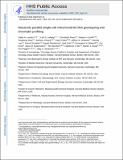| dc.contributor.author | Lareau, Caleb A | |
| dc.contributor.author | Ludwig, Leif S | |
| dc.contributor.author | Muus, Christoph | |
| dc.contributor.author | Gohil, Satyen H | |
| dc.contributor.author | Zhao, Tongtong | |
| dc.contributor.author | Chiang, Zachary | |
| dc.contributor.author | Pelka, Karin | |
| dc.contributor.author | Verboon, Jeffrey M | |
| dc.contributor.author | Luo, Wendy | |
| dc.contributor.author | Christian, Elena | |
| dc.contributor.author | Rosebrock, Daniel | |
| dc.contributor.author | Getz, Gad | |
| dc.contributor.author | Boland, Genevieve M | |
| dc.contributor.author | Chen, Fei | |
| dc.contributor.author | Buenrostro, Jason D | |
| dc.contributor.author | Hacohen, Nir | |
| dc.contributor.author | Wu, Catherine J | |
| dc.contributor.author | Aryee, Martin J | |
| dc.contributor.author | Regev, Aviv | |
| dc.contributor.author | Sankaran, Vijay G | |
| dc.date.accessioned | 2021-10-27T19:58:19Z | |
| dc.date.available | 2021-10-27T19:58:19Z | |
| dc.date.issued | 2021 | |
| dc.identifier.uri | https://hdl.handle.net/1721.1/134144 | |
| dc.description.abstract | © 2020, The Author(s), under exclusive licence to Springer Nature America, Inc. Natural mitochondrial DNA (mtDNA) mutations enable the inference of clonal relationships among cells. mtDNA can be profiled along with measures of cell state, but has not yet been combined with the massively parallel approaches needed to tackle the complexity of human tissue. Here, we introduce a high-throughput, droplet-based mitochondrial single-cell assay for transposase-accessible chromatin with sequencing (scATAC-seq), a method that combines high-confidence mtDNA mutation calling in thousands of single cells with their concomitant high-quality accessible chromatin profile. This enables the inference of mtDNA heteroplasmy, clonal relationships, cell state and accessible chromatin variation in individual cells. We reveal single-cell variation in heteroplasmy of a pathologic mtDNA variant, which we associate with intra-individual chromatin variability and clonal evolution. We clonally trace thousands of cells from cancers, linking epigenomic variability to subclonal evolution, and infer cellular dynamics of differentiating hematopoietic cells in vitro and in vivo. Taken together, our approach enables the study of cellular population dynamics and clonal properties in vivo. | |
| dc.language.iso | en | |
| dc.publisher | Springer Science and Business Media LLC | |
| dc.relation.isversionof | 10.1038/S41587-020-0645-6 | |
| dc.rights | Article is made available in accordance with the publisher's policy and may be subject to US copyright law. Please refer to the publisher's site for terms of use. | |
| dc.source | PMC | |
| dc.title | Massively parallel single-cell mitochondrial DNA genotyping and chromatin profiling | |
| dc.type | Article | |
| dc.contributor.department | Massachusetts Institute of Technology. Department of Biology | |
| dc.contributor.department | Koch Institute for Integrative Cancer Research at MIT | |
| dc.relation.journal | Nature Biotechnology | |
| dc.eprint.version | Author's final manuscript | |
| dc.type.uri | http://purl.org/eprint/type/JournalArticle | |
| eprint.status | http://purl.org/eprint/status/PeerReviewed | |
| dc.date.updated | 2021-07-22T14:57:50Z | |
| dspace.orderedauthors | Lareau, CA; Ludwig, LS; Muus, C; Gohil, SH; Zhao, T; Chiang, Z; Pelka, K; Verboon, JM; Luo, W; Christian, E; Rosebrock, D; Getz, G; Boland, GM; Chen, F; Buenrostro, JD; Hacohen, N; Wu, CJ; Aryee, MJ; Regev, A; Sankaran, VG | |
| dspace.date.submission | 2021-07-22T14:57:54Z | |
| mit.journal.volume | 39 | |
| mit.journal.issue | 4 | |
| mit.license | PUBLISHER_POLICY | |
| mit.metadata.status | Authority Work and Publication Information Needed | |
